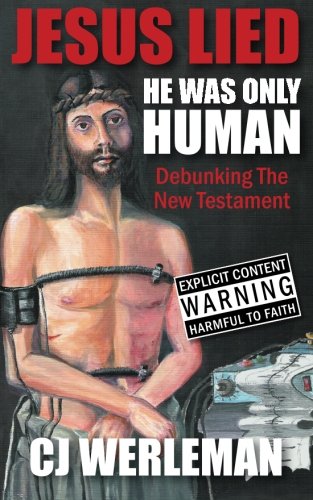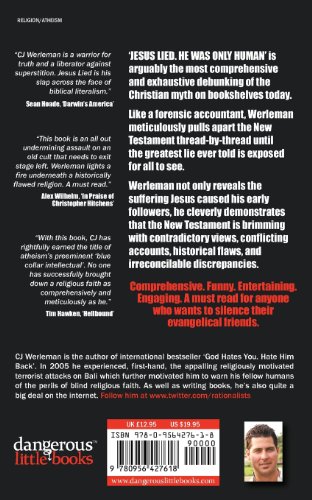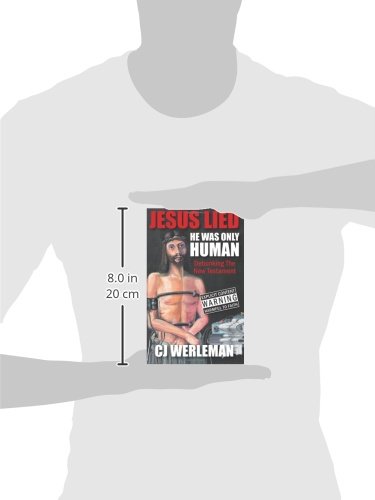



Jesus Lied - He Was Only Human: Debunking The New Testament
B**U
Awesome close reading of the New Testament
I haven’t read the Bible in several years — and probably won't do so anytime soon —, but CJ Werleman’s Jesus Lied provides the type of close reading of the Synoptic Gospels that I never got when reading the Bible in my early college days.With humor and critical scholarship (not of the dry kind), Werleman explains the contradictions, fallacies, and varying interpretations of Jesus's so-called life, and most importantly how the Gospels were far from harmonized. For example he shows how the more than 70 anti-Semitic references in the Book of John are the root cause of anti-Semitism throughout history, which is information and analysis I quite honestly was never aware of, but should have been. He shows how odd it is that the founder of the Christian church, Paul, had little or nothing to say about Jesus's life, though he possibly was a contemporary of Jesus, and scholarship shows that he actually wrote his biblical texts before Mark, Matthew, Luke, and John.More importantly Werleman shows that if Jesus did in indeed exist, his ministry and prophecies are based on an apocalyptic cult, in which he constantly talked about people living in internal damnation (one of many examples: “Death is just the commencement of true suffering should you not heed the b.s. frothing from my mouth.”–haha, Werleman’s paraphrasing.) if they did not believe in him, and his equally barbaric godfather.My review can't even do justice to the scholarship and analysis that Werleman provides in his book. Interestingly much of this history and analysis is also provided in Bert Ehrman’s How Jesus Became God, but Ehrman can't decide if he believes in Jesus or not — he’s agnostic when it comes to God. I found it very frustrating to read Ehrman’s book, and thus couldn’t wait to get my hands on Jesus Lied — this based on my previous reading of Werelman’s first book, God Hates You, Hate Him Back.If you read Jesus Lied, pay particular attention to chapter 13, “The Gospels on Why Jesus Had to Die.” I've been asking the question for years, what difference did it make that Jesus died and rose from the dead? His death and resurrection doesn't seem to have changed much of anything, and as miraculous as it was supposed to be, there are no other sources outside of the Bible that mention the event. Human beings are no better off because of his suppose it sacrifice, which also begs the question, why did he have to be sacrificed? If he was sent it to “pay the price of our sins,” then who was the price being paid to? Why does God, the author of the entire universe, need his “only begotten son” to die a bloody death on the cross? That kind of death and sacrifice doesn't in any way compare to the creation and complexities of the universe. The two events are trillions of miles apart in comparison. The notion of a sacrifice, if it ever happened should be utterly embarrassing to the so-called creator.The reason I will probably never reread the Bible is because it is mostly a bunch of ancient, mythological stories propagated by god-fearing, ethnocentric, so-called prophets and ministers. Like most religious doctrines, the whole-life after-death scenario is used to scare people into living a righteous life, and supporting religious leaders and demagogues. It's utterly embarrassing that we have allowed these religious texts to have such a deep influence over our culture and sense of humanity. Enough this silliness, it’s time to grow up.If you're an atheist, you owe it to yourself to read this book, because it provides the type of arguments you want to use when discussing religious text with Jesus believers. If you are believer, you should also read this book to see if you can counter the analysis that Werleman makes. He should definitely have you going back to the Bible and reading the Gospels more carefully. If you're not willing to do that, you honestly don't have any knowledge of what you believe in.One last point I want to make is that Werleman closes his book with a chapter titled, “Did Jesus Exist?”, which I think is a question Ehrman should reconsider. Werleman finds the question difficult to answer, but he at least raises it, and he points to sources that attempt to answer the question. The more I read and think on this question, I’m beginning to conclude that Jesus was quite possibly a fictional character, or if he did exist, the reports about him are so saturated with myth, as Werleman’s book points out, that it’s difficult to draw any factual evidence and conclusion about his life. Many of us do know however, that Jesus certainly was no god in flesh, and his dead axx won’t ever be returning to earth “riding atop a white fluffy cloud (really!) in order to bring judgement upon mankind.”
C**S
Jesus outdated
Humour, abrasive wit, and sarcasm bring a breath of fresh air into the spheres of biblical criticism and remove the bibles from their ongoing atmosphere of unresolved tragedy. Jesus is approached through modern vocabulary and modern concerns, all of which show that the messiah is terribly outdated. The book is great fun and reveals a lot of common sense.The author however has not got the earliest background into proper focus. The prime concern during the first century was to become the leading if not exclusive religious party to administer the spreading survival hopes. That is what the gospels are really about. The evangelists are founding a new political religious party based on a messiah-mediated revival cult. Important to understand is that the two gospel messiahs, Jesus and John the Baptist symbolised two sides, avant-garde versus traditionalists, of the Essene institution. (Just as the star actors of the OT, Moses and Aaron, already stood for two sides of the Abraham inspired shrines in Judah and Israel). Once the messiah code has been understood, the gospels take on a completely different meaning and become interesting as witnesses to historical debates within political parties. They are not narrating the biography of a man Jesus but are giving us an account of an intracommunity struggle at successive phases of community evolution. Mark is the angry and intolerant man, Matthew tries to cohere the divided community within the ranks of the winners, rehabilitating John the Baptist which means accepting that the traditionalists belong to their antecedents. Luke tries to steer the new party closer to the Jerusalem temple teachings. The revival movement can be compared to todays ecology strategies that started a century ago and are now growing into political parties with outside disputes, competition and endless internal quarrels. They are also surfing on an end of world fear and produce income to prevent (un)foreseen issues. So the main problem the author faces, as with most scholarly books, is that Jesus was not a first century person but represented a division within an Essene institution, John the Baptist personifying the other side of the coin. Within this context, the resurrection story was no more than a priority claim, linking the new party and god's arbitration. As for Paul, he starts his proselytising just where the gospels end: death, resurrection and the second coming. He was a clever opportunist who had to invent all his arguments facing different audiences and criticism.This amusingly disrespectful book has no patience when dealing with convinced apologists and they probably don't deserve more consideration. The author presents nothing new and also has missed important points but he writes with brio and guts and should delight many. The debates become accessible even to the least prepared in New Testament interpretation.
P**É
poorly written
While this topic has a lot going for it, it is without a doubt one of the most poorly written books I have read! Chris Hitchens, to whom it is dedicated, must be spinning in his grave... Typos, missing words and let's not talk about punctuation. To bad the actual bool is not as well written as the afterword! A shame. Other than that, entertaining.
C**D
Horribly edited
There are spelling and grammatical errors throughout. This makes it difficult to take the content itself seriously.
S**O
Another great CJ Werleman book.
Still reading this book but thus far an excellent read.
B**N
Not for theists
A book written for the athiest and agnostic audience. Not recommended for theists as the vernacular can come of as arrogant or offensive. I loved every minute of the read.
E**N
So, Jesus lied?
I was not surprised by what Mr. Werleman had to tell us about Jesus, but I was not impressed by the language he thought he had to use to serve his truths to the world.🤔
Trustpilot
2 weeks ago
2 months ago